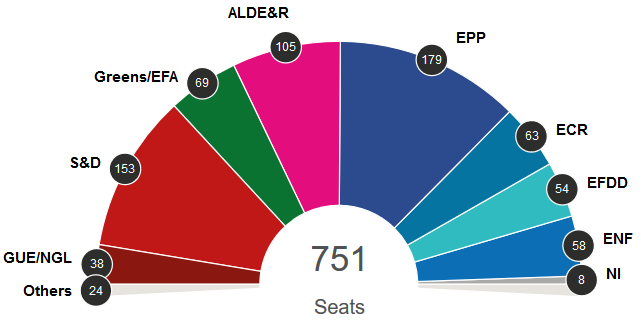Stay in the loop! Subscribe to our mailing list
More than 200 million EU citizens casted their vote during the European Parliament’s elections from 23 to 26 May 2019 in the EU28. Why are these elections extremely important for the higher education (HE) and research policies? Because, although education is a ‘shared competence’ between the European institutions on the one hand and the member states on the other, European Commission has the right to propose new legislation and the European Parliament (EP) has an indirect but strong influence on EU HE and research programmes such as Erasmus+ and Horizon2020, in terms of budget and funding, rules’ amendments and interim evaluations. Moreover, the EP approves the European Commission.

But what will the new European Parliament look like? The major changes brought about by these last elections show the end of the traditional “grand coalition” between the conservatives – the European People’s Party (EPP) - and the social democrats (S&D). Right-wing Eurosceptic parties - divided over ECR (European Conservatives and Reformists Group), EFDD (Europe of Freedom and Direct Democracy Group) and ENF (Europe of Nations and Freedom Group) - made significant gains not only in countries where they had already won large constituencies, such as France, Hungary and Poland, but also in Italy, the UK, Belgium and Austria. With 28 MEPs, Salvini’s Lega Nord represents the biggest delegation in the new ENF alliance, while in the UK the Brexit-party won by far. The Socialists surprisingly won in The Netherlands, while in Germany the CDU, but even more the SPD, faced an historic defeat and the Greens made very impressive gains. However, the main winners of these elections were the voters, with an incredibly high turnout of almost 51%, the highest in the past twenty years.
In conclusion, the most likely scenario is that pro-EU forces, such as the liberals from ALDE, the Greens, EPP and S&D, will establish alliances to form the majority in Parliament. As for the next steps, on 20-21 June, the EU Council summit will nominate the Commission President; on 2-4 July, the European Parliament President, Vice-Presidents and quaestors elect and appoint Committees, while on 15-18 July, during the second EP Plenary Session, the European Parliament will elect the President of the Commission.

Source: European Parliament